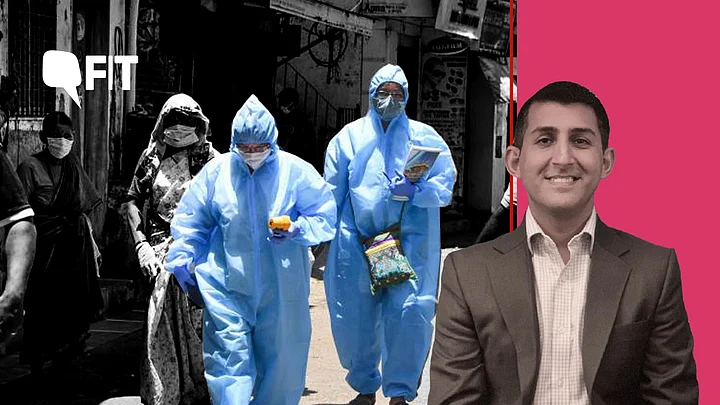If it’s not the disease, it’s the fear of the disease that will get you”. How often have we heard or read this phrase over the past few months? I first covered the stigma of Covid-19 two months ago, in a piece which was originally written to raise the awareness of the difficulty healthcare workers were facing in India. A trend which reached such worrying scales that the Health Minister and the Prime Minister both spoke up against this.
Finally, an ordinance was passed, penalising anyone for speaking or acting against them.
But it’s not gone away; the deep rooted fear of the virus became the thread for my community visits today.
She was just over fifty years old, had no symptoms of the disease but my support team was concerned; she had a heart rate of over 140 beats per minute. Her husband had just tested positive, for the virus, and the room which they shared with their two children was sealed.
She was allowed down by the ASHA workers to see me in the society office on the ground floor, the first time I had conducted a medical camp this season indoors. It was a luxury to have a fan above me to fight away the Indian summer. Diligently I took a medical history, whilst feeling her pulse. It was beating fast. She looked completely well and clinically the probability of her harbouring an active illness seemed low. I asked her what I thought was the obvious question, “Have you run here to see me?” in a jovial tone; inferring that it may have been the cause for the tachycardia. “No” she replied in Hindi, “I am feeling scared”.
In the conversation that followed she spoke about how she has been made to feel, by the local residents around her, not always on purpose, about staying in the sealed room with her case positive husband.
“Where am I to go? Who will look after him?” A completely fair question and something which those guilty of privilege can sometimes forget. This disease has, like so many infectious diseases of modern times in India, been harder hitting on those with fewer means.
The practicalities of physical distancing and living in a lockdown are very different when one lives in a small 80 to 100 square foot room with four to five other people, sharing common washroom facilities and earning a daily wage in the informal economy.
Added to these hardships is the frenzy created in the popular press through its coverage of the virus and the fear it has instilled in practically all of us. A fear which can sometimes make us react to another human being in a manner which can make them feel estranged and ostracized.
The team spent a few minutes counselling her and offering her words of calibrated hope and encouragement. We may not be able to change the zeitgeist but we can be warm to a fellow citizen and express our empathy. After all, each journey starts with a single step. The lady was not the only resident that felt this way. Over the course of the three hours which I spent in the camp, screening over seventy individuals, at least four people shared these sentiments.
On my drive back to the main office I had the chance to ask the team how they felt about the conversations we had today.
I deeply respect their views as these front line staff work day after day, for fourteen to sixteen hours, across the city.
It is their incredible tenacity and dedication which is helping the city with its control and containment efforts against this virus. They shared with me a very interesting insight into the collective fear which has developed for this specific illness. Both seasoned health workers, one of whom has been involved in care work dating back to the eradication of the Polio epidemic in India, I was reminded of the burden of illness in the country and how significant the loads are from other vector-borne diseases.
Infectious conditions like Malaria, Dengue, Chikungunya, and Tuberculosis are still very commonplace; efforts against which are unfortunately being significantly deprioritised - as all resources are being targeted towards the fight against Covid-19.
With lesser than normal mosquito treatment and fumigation activities in the city, the crew spoke of the rise in Malaria cases they are already seeing in the northern parts of the city. A trend, which if left unchecked, could overwhelm the significantly bolstered but already stretched public health infrastructure.
There is a refreshing sense of pragmatic realism which I obtain from my interactions with the front line workers I have each week. Well equipped by the authorities with adequate PPE, vital parameter equipment, medicines and support crew, slowly but surely we are making our way through local communities screening, treating and controlling.
We are playing our part. What would help is a normalisation of the Covid-19 narrative in society, reducing the negative sentiments within the collective psyche and an acknowledgment that this virus is just one of many challenges that we each face in the months to come.
(Dr. Marcus Ranney is a business professional in healthcare and technology. He has volunteered for COVID duty. From the Frontlines is his first-hand account of his experiences battling Covid-19 in the city of Mumbai.)
(At The Quint, we question everything. Play an active role in shaping our journalism by becoming a member today.)
